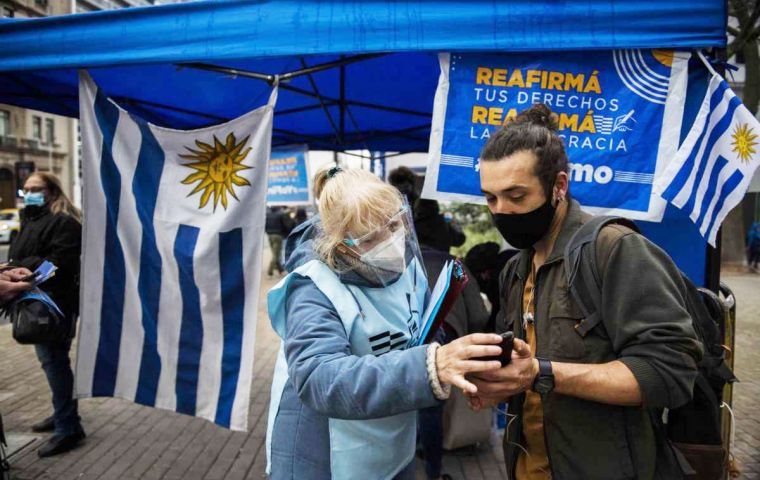MercoPress. South Atlantic News Agency
Uruguay's opposition files for referendum against emergency law
 The LUC was approved through emergency proceedings due to the covid pandemic
The LUC was approved through emergency proceedings due to the covid pandemic  The package of 501 laws that laid the foundations for Luis Lacalle Pou's government left parliament with 476. There were many changes in between, especially in polemic articles.
The package of 501 laws that laid the foundations for Luis Lacalle Pou's government left parliament with 476. There were many changes in between, especially in polemic articles. Uruguayan opposition politicians are ready to submit a petition for the partial repeal of the government's Urgent Consideration Law (LUC).
The request is to be filed just before the legal deadline and is reportedly backed by more citizens than the minimum number required by the Constitution.
The so-called Pro-referendum Commission is to bring the document to Uruguay's Electoral Court to convene a citizen consultation about 135 of the 500 articles of the LUC.
Dozens of social organizations regard these provisions as outdated in that they signal a conservative, neoliberal, repressive and anti-worker restoration program.
They also oppose the LUC because it circumvented a broad democratic discussion under the excuse of restrictive sanitary conditions due to the Covid-19 pandemic.
The package of 501 laws that laid the foundations for Luis Lacalle Pou's government left parliament with 476. There were many changes in between: the most relevant ones during the 76 days of treatment occurred in the Senate, especially in the chapter on security and in controversial laws that liberalised the import of fuel and the use of infrastructure of state-owned companies such as the telephone company Antel by private companies.
Unable to demonstrate en masse, opposition leaders pilgrimaged house by house asking people for their signatures to file the petition for a referendum.
The Broad Front and all the other forces involved hope that with the validity of this civic exercise the missing democratic debate will open about legislation that deals with the economy, companies, labour, housing, security and even an educational reform.
When some 675,000 signatures were required, organizers claimed to have already gathered over 700,000 but were going to spend the night (Thursday's dawn) at the corner of the Electoral Court in Montevideo in case somebody else wished to join their efforts.
“It has been a feat, an impressive democratic feat, in a framework of great respect and participation, both of those who signed and those who did not sign. Although it was developed with enormous difficulties, in the midst of a pandemic, in periods in which there was hardly any mobility on the street, and at first all the analysts said that it was a chimaera, it is an objective that at this time is it is concretizing,” opposition leader Marcelo Abdala said.
Feminist leader Soledad González insisted that the more signatures the better. “If we get to 700,000 it is a good figure, but if you present 710,000 it is safer so that the referendum is inevitable.”
A full adherence of 25% (or roughly 675,000 people) of the electoral roll is required for the Electoral Court to call for a referendum.
The promoters of the popular call are expected to announce this Thursday afternoon via streaming the total number of signatures collected up to that moment and then rally to the Electoral Court to deliver the petition at around 5 pm.




Top Comments
Disclaimer & comment rulesCommenting for this story is now closed.
If you have a Facebook account, become a fan and comment on our Facebook Page!